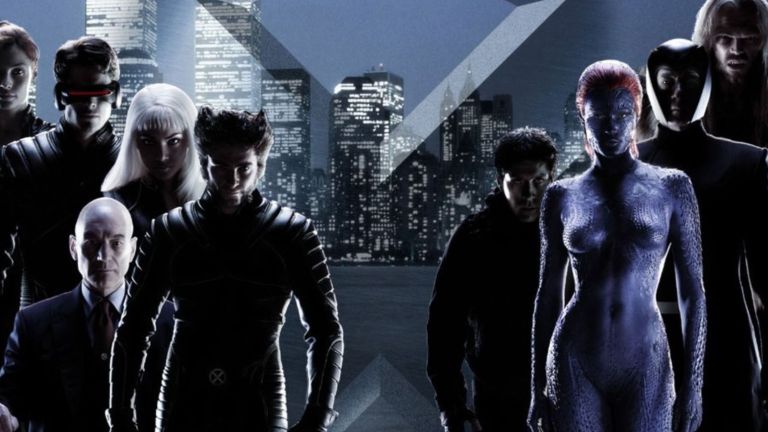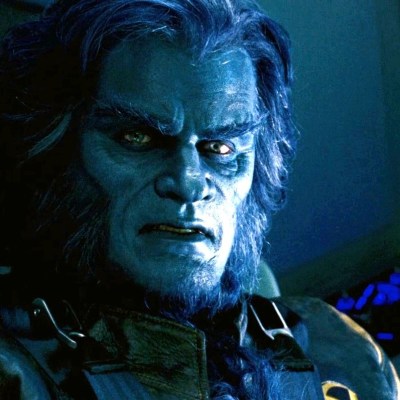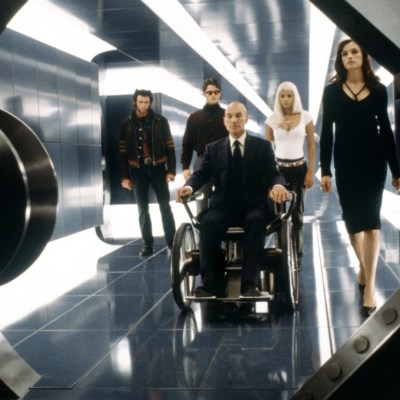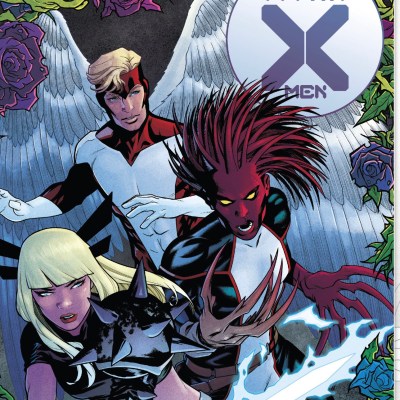How The First X-Men Movie Changed The Superhero Genre
Screenwriter David Hayter recalls the development and production of the first X-Men movie, which came out 20 years ago and changed things forever.

Back in the late 1990s, things didn’t look so hot for superhero movies. Warner Bros. Pictures crashed its Batman franchise into the ground with 1997’s disastrous Batman and Robin and showed no signs of resurrecting either that or any of its other DC comics heroes. Meanwhile, with the one bright exception of 1998’s Blade, not a single Marvel Comics character had made it to the big screen in a meaningful way.
All that changed, however, in 2000, when 20th Century Fox released X-Men.
Based on one of Marvel’s most enduring properties, the Bryan Singer-directed film introduced the concept of mutants via well-loved characters like Professor X (Patrick Stewart), Wolverine (Hugh Jackman), Storm (Halle Berry), Magneto (Ian McKellen), Cyclops (James Marsden), Jean Grey (Famke Janssen) and Rogue (Anna Paquin). The story incorporated themes of bigotry, tolerance and family that were present ever since Stan Lee and Jack Kirby created the original X-Men comics in 1963.
In other words, the movie took the characters and comics seriously and was actually about something. It was also a surprise hit, earning $296 million worldwide against its relatively slim $75 million budget. It proved that even lesser known (to the general public) comic book characters could star in successful movies, paving the way for not just a succession of X-Men sequels and spin-offs but later achievements like the Marvel Cinematic Universe.
That first movie, however, took a long and torturous route to the screen. After Fox acquired the rights in 1994 the studio commissioned a series of top shelf screenwriters — including Andrew Kevin Walker (Seven), John Logan (Penny Dreadful), James Schamus (Hulk), Ed Solomon (Men in Black) and Singer collaborator Christopher McQuarrie (The Usual Suspects) — to whip an X-Men script into shape.
While some elements of all their work made it into the finished film, the man who got sole screenplay credit was David Hayter. A writer, producer and actor who got a job in the X-Men production office, Hayter’s began revising the script well into production based on his knowledge of the comics, working with Singer, producer Tom DeSanto, and a young associate producer named Kevin Feige.
They say success has many fathers (and mothers), and in the case of X-Men, there seemed to be a true collaborative effort — even despite turmoil among some of the filmmakers involved — that helped bring X-Men to the screen and arguably launch the era of the modern superhero movie. One of those fathers was David Hayter, who spoke with us extensively by Zoom about the creation of X-Men — which was released 20 years ago this summer — and his role in it.
Den of Geek: I know this story is out there, but how did you get involved with X-Men? You had made a film that Bryan Singer produced, correct?
David Hayter: Basically, we had produced the film, Burn, and Bryan was the executive producer, and we had a deal with Lakeshore, but it fell through. So then I was a depressed, broke film producer. Bryan was kind enough to give me a job answering the phones on X-Men, and he knew me as a filmmaker. Just lucky enough, I had been a huge X-Men fan in the late ’70s, early ’80s, so I knew the characters very well, and Bryan realized he had a resource right in the office for keeping the X-Men the X-Men. It was just a remarkably lucky confluence of events.
He asked you to help him solve something in the script, liked what you did, and the next thing you knew, you started working on the rest of the script.
Correct. Yeah. He couldn’t figure out how to say the word, “X-Men”, to have a character say it without it sounding ridiculous. That sounds silly now, but at the time, was a great concern. So I suggested a scene where Wolverine walked across the mansion grounds, and he runs into Cyclops. And they have a pick-up basketball game, and Cyclops is saying, “Why don’t you join the team?” And it’s getting more heated, and Wolverine says, “Look, why don’t you and Xavier and all your little X-Men go to hell.” And he pops the ball.
I said, “That way you get your movie star, your lead, to say it, but he’s sort of making fun of it, so that kind of takes the sting off of it being too grand or too ridiculous.” Bryan said, “Yeah, good. Go write that for me.” I figured he was kidding, but he was not. And then he started having me do rewrites. Every day, he’d come up with ideas, or we’d discuss ideas, and I’d be working on it, and he’d tell me not to tell the studio that I was working on the film.
By the time they figured it out, I’d already rewritten half the script, so they were forced to make a deal with me, and they paid me $35,000, which was the guild minimum rewrite fee. That’s the lowest anyone’s ever been paid for an $80 million film, I believe, in history, and I was thrilled to get it. I worked on the film for the next 13 months.
What was the script looking like when you started working on it? Did you look at any of the past versions and see what they had done?
Oh, yes. Well, like I say, the studio was not thrilled that their phone answer guy was writing the script, so they made me read everything. They sent me old drafts. I read Andrew Kevin Walker’s draft and Ed Solomon’s draft, and I was working off of Chris McQuarrie’s draft. All of whom are legendary writers.
What was the difference? Well, there had been a lot of different tacks taken. There was a romance between Wolverine and Storm. There were Sentinels, the Danger Room, Beast. There were all sorts of different things. Andy Kevin Walker’s draft was very good, but Bryan had moved onto the basic story that Ed Solomon had created, which was Rogue comes to the mansion, and we introduce the audience through Rogue and Wolverine’s eyes.
We had 11 super-powered lead characters that weren’t as well-known as Batman, or Superman, or anything like that. So really, the goal with it was keeping it clear, making sure that people understood the world and the powers, the names, everything. The first movie is really, just all setup and a very simple skeleton of the story.
There was a tendency to make fun of comics, take it lightly, and for the studios to sort of make the writers approach it that way. The difference here was that Bryan Singer had never read an X-Men comic, and he just wanted to make a great movie with real characters and real interactions, and I wanted to make a real X-Men movie to replicate the experience I had reading the comics when I was a kid.
So it was like lightning in a bottle. It just kind of worked out as a confluence of all our input. Kevin Feige, who at the time was working for Lauren Shuler Donner, was working on the film, and he came into the scripting process. And obviously, Kevin knows the X-Men and the Marvel characters better than anybody. So he became a big influence, as well with Tom DeSanto, the producer of the film.
I read that Andrew Kevin Walker’s script was the only one that actually featured the original team as a fully-fledged team, like the comics.
I’m not sure what that means, because I know it had Storm. If you’re talking about the original team of Cyclops, Iceman, Beast, Angel and Jean Grey, it’s possible, but it also has the quote-unquote new X-Men, Wolverine, Storm. I don’t really recall. I remember they went to Niagara Falls.
Was it a challenge to kind of balance the old and the new, knowing that you would get people who did read the original Stan Lee/Jack Kirby comics, and then you’d get people who, to them, the X-Men were all about Wolverine?
Well, I’ve said this before. It sounds callous, but I didn’t work on it or write anything with the idea of pleasing the fans. I worked on it from the perspective of, I was very much in love with the Chris Claremont Uncanny X-Men era, and that’s what I was trying to recreate.
I mean, I love the original Kirby-Stan Lee books as well, but Wolverine was a revelation. Wolverine is what makes the whole thing really come alive. And so, there was never any question for me that it was going to be anything but that relatively new X-Men team.
I was trying to make the movie feel as much to me like X-Men as I thought it should, and I thought, “If I can really get excited about this, a great many fans will also be excited about it.”
Tom Rothman, who was the head of 20th Century Fox at the time, said, “David, the comic book fans will be done by 10:00 Friday night, and we have to get everyone else.” So that made it clear to me that, yes, engaging the comic book fans and giving them a true experience was important, but more important was creating a world that an additional group of millions of people could appreciate and attach to. That was really the bigger goal, and I felt that the keys to doing that were in the comic books that I love.
Do you think that working with an $75-80 million budget — which was not a lot for a superhero movie even back then — help you in a way because you had to focus on character?
I think that’s correct. I had a huge sequence where Jean and Cyclops go to get a mutant who has frozen his entire school, which, of course, is Bobby (Drake. a.k.a Iceman), and it was really cool, but very expensive. And they were like, “It doesn’t drive the narrative, so it doesn’t stay in.”
So we were forced to focus on more character. But the problem with that was the first cut of the movie was like two hours and 10 minutes long, and we called it, “Woody Allen’s X-Men” because it was just all talk and there wasn’t enough action to sustain the film.
The first cut I saw, I was like, “I think we’re just dead. I guess I’ll go back to bartending or something.” And then Avi Arad, Tom Rothman, and Bryan Singer sat down. And from what I hear, it was Tom Rothman who said, “I think there’s a really good movie in here.” And they cut it down to 93 minutes or 98 minutes, whatever it is. They cut it to the bone, and then it balanced out. It felt like we had so many great character moments, but it was balanced out with the amount of action that we could afford.
It’s interesting to hear you talk about Rothman, because I think among fans, he’s perceived as sort of anti-superhero movie, and that he wanted to kill the X-Men franchise at one point. Is that a misconception?
Yeah. Tom Rothman is an extremely smart guy. He’s an extremely savvy film exec, I mean, one of the most successful that there ever was, and he was committed to the movie. You know when Wolverine pops the one claw and aims it at Cyclops like it’s the finger? The quote we got from one of the executives was, “I don’t think you understand how important the claw finger is to Tom Rothman.” So I would say, my personal experience of him, he was totally committed to it.
At the same time, he’s trying to balance the needs of the studio and balance the budget. I think that he had a ton of ideas, and some of them went along with what Bryan was looking to do, and some of them didn’t. I would say that when Tom has a really smart director who’s willing to say, “Well, Tom, I love this idea, but that idea I think is going to hurt us,” he’s one of the best executives there ever was.
I think if he’s got a weaker director who is afraid to stand up to him, they might get rolled over, steamrolled a bit. And just as the editing saved the movie, I think Bryan’s editing of Tom’s ideas produced a really unique combination of brilliance.
So yeah, I think Tom deserves a good amount of credit for creating the Fox X-Men. Whether he wanted to kill it down the road, I have no idea. I was gone after X2, but I certainly learned a lot working with Tom.
The film opens with a scene written by Christopher McQuarrie in which Magneto as a young boy is separated from his parents at Auschwitz — at the time a shocking way to open a comic book movie. Do you feel like that just set a whole different tone and reset the expectations for what this could be?
Absolutely. I mean, there wasn’t any question. Once I read the scene, once Bryan read the scene, there wasn’t any question that it was such a bold and amazing statement. And really, what I’ve always loved about Magneto is, to a great extent, Magneto is right. He’s saying to Charles, “They’re coming to kill us, and we have the power to stop them.”
So not only is it completely relatable, but when you see that Auschwitz scene, and you see his parents taken away, and the fact that he almost was able to stop it, it’s such a brilliant creation of that character. You just understand him for the rest of his existence.
I think for myself, I was like, “There is a coolness and reality in comic books that has not been tapped properly in any of them.” I mean, Richard Donner’s Superman was pretty true to the character, but Superman is very light and breezy. And Tim Burton’s Batman also created a Batman-like world, but at the same time, still, it was like tongue-in-cheek, and it was still weird.
I was just trying to look at these people as real people. So we knew that that Auschwitz scene not only fit what we were trying to do, but elevated it beyond our hopes.
I think there is a dual legacy to this movie. Number one, even though Blade sort of paved the way in 1998, X-Men definitely busted the doors open for the superhero genre. And the second legacy is the fact that you had these relevant and timely themes that still hold up today.
Yeah, sadly enough. But yeah, what Blade did was it showed that a non-Batman, non-Superman superhero movie could make $90 million, and it’s a brilliant, kick-ass, action film. Wesley Snipes is amazing. It just shows that you could make a comic book movie that worked. I think we had a little bigger budget. The X-Men were better known than Blade, and I think we did make it a little more real.
You did work on X2. How much of what you wrote for X2 ended up in that movie, would you say?
A fair bit. I mean, I worked on it for a year, and then I handed it off in February, and they went up to shoot it in March. I wrote the opening Nightcrawler sequence. I mean, I’m not going to go through everything I didn’t write, but my draft was very strongly represented.
At the same time, Mike Dougherty and Dan Harris came in to do on-set rewrites. And on a Bryan Singer film, you’re doing on-set rewrites constantly, so their voices are also quite prominent in the final draft. But I feel like as opposed to the first movie — first movie, I was trying to replicate Chris McQuarrie’s voice, which is more elevated than me, which is more literarily influenced. And the second movie was a little more my voice, a little more fun, a little more kick-ass, a little more diving into it with your hair on fire. And I think that, that shows.
So you were doing on-set rewrites on X-Men as well?
Yeah, for the first X-Men, I was there for everything. I’d be making up lines and whispering them to Bryan. He’d be telling the crew. I mean, it was insanity. Every day was another set of drafts. It was very cool, and I wish I could’ve done that for X2, but I was committed to shoot a pilot in Australia for Warner Brothers right after I handed in the draft. So unfortunately, I couldn’t be on set.
You wouldn’t have an MCU, I think, without that first X-Men movie.
That’s very kind of you to say. Like I say, it was lightning in a bottle. It was an empowered filmmaker, who wanted to make just a realistic-feeling superhero film, combined with a couple of young Marvel fans, X-Men fans, and teamed with a studio that was willing to take a risk.
Will it be replicated? I mean, I would argue that the brilliance of Kevin Feige is that you have to be nigh on insane to say, “We’re going to build all this up to 27 movies and then create the Avengers movies.” To conceive of the fact that you’re going to make movies that huge, with those actors, at that level, is so gutsy and so insane, and yet, so much what the comic book fans wanted and were dying for. They wanted the movies to treat the comic books the way the comic books were written.
That means interaction, that means romance, that means scale, that means combos and team-ups and all this stuff. And Kevin was unafraid to do that. So I would say the next iteration of what we did on X-Men happened on The Avengers.
This interview has been edited for length and clarity.



